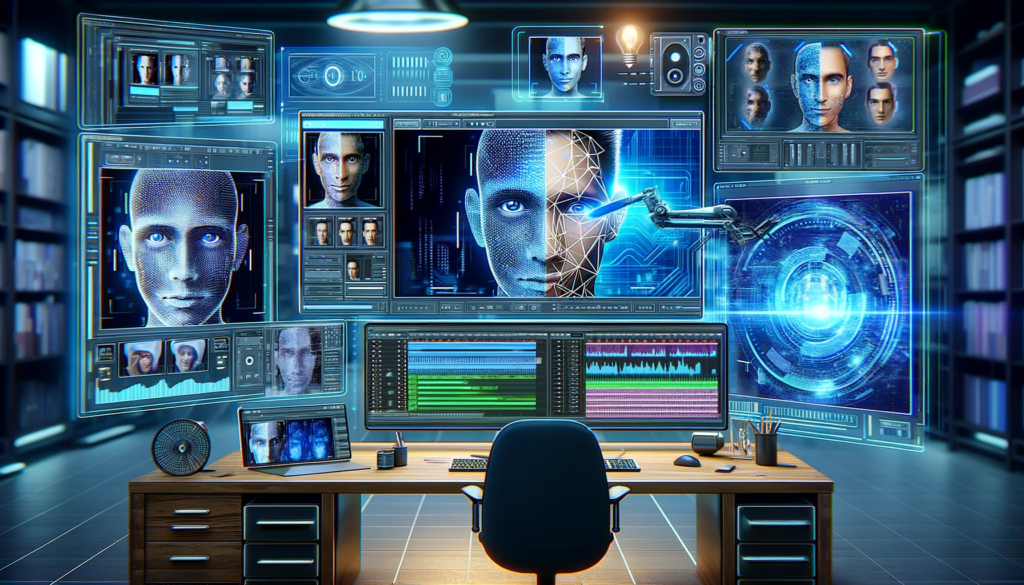AI Camera Basics: Understanding the Technology
AI Cameras Technology represents the convergence of machine learning algorithms and optical technology in a single device, transforming the way photos are captured and processed. The core aim of these AI cameras is to mimic the human vision system, providing more accurate, detailed, and realistic visual output. The robo eyes operating these cameras can analyze a frame, make intelligent adjustments in real-time, and ultimately capture stunning images.
At the heart of AI cameras lies their advanced machine learning capability, which is being constantly perfected and expanded to improve image capturing and processing. This technology learns from different scenarios, lighting conditions, and subjects to build knowledge over time. AI camera technology is employed in a variety of devices, varying from simple smartphone cameras to sophisticated DSLR and mirrorless cameras, where the implementation and permutation of AI significantly differ. To summarize, AI cameras present a significant stride in the world of photography, poised to revolutionize the art and science behind every picture.
AI Cameras in Smartphones: Enhancing Mobile Photography
There is no question, the advent of mobile photography AI has dramatically changed how photographs are captured, edited and shared. From trails in the wilderness to bustling urban streets, moments are being captured with great precision and clarity. Facilitated by AI cameras in smartphones, the technology behind these impressive results is rapidly advancing. Simply, even users with minimal knowledge of photography can now attain professional-style results with a couple of taps.

Advanced AI in DSLRs and Mirrorless Cameras
The integration of AI in mirrorless cameras and DSLRs takes professional photography to an elevated level. The central aspect is AI's ability to optimize images at the point of clicking them, maintaining a comprehensive balance between lighting, detail, and general aesthetics. AI cameras leverage algorithms to enhance focus on the subject, improve output, and proactively manage shutter speed, aperture, and ISO settings. By incorporating machine learning and cognitive services, these state-of-the-art AI cameras can process real-time data, ensuring improved image quality even under less-than-ideal conditions.
Another exciting application of AI in advanced photography tools is the photo editing AI. The evolution of photo development process has come a long from from darkrooms and chemicals to digital editing tools. Now, AI steps in to make this post-processing even more efficient and accurate. With AI-powered tools, photographers can automate the selection of optimal filters, the removal of unwanted elements, and the necessary adjustments, making the photo editing process a breeze. AI cameras' features such as auto object detection, presets, and intelligent forecasting equip photographers with a high degree of flexibility and precision, thus greatly enhancing creative possibilities.
AI's Role in Photo Editing and Management
The progression of AI camera applications has significantly aided in revolutionizing the facet of image editing and management. Now, even beginners in the field of photography can manipulate and enhance their photos in ways far beyond the traditional options and techniques. AI cameras have allowed for a dynamic shift in editing practices, introducing features such as automated object detection and recognition, smart filters, and more.
Furthermore, AI image management has become an increasingly helpful tool for photographers and companies at large. AI-powered image management systems can automatically categorize, tag, and manage large amounts of photos with remarkable speed and accuracy. This not only saves significant time but also eliminates the risk of losing valuable images amidst an extensive collection. Such achievements epitomize the transformative power of AI cameras, presenting both dramatic improvements in photo editing and more organized management.
Diverse Applications of AI Cameras
AI cameras have opened up a myriad of applications, from standard consumer uses like enhancing personal photography to broader implementations in surveillance, automobile safety, medical imaging, and more. For instance, in the security industry, AI cameras aid in recognizing faces, detecting suspicious behaviors, and even predicting potential threats through pattern recognition. In the field of autonomous vehicles, these cameras play a crucial role in identifying obstacles, interpreting traffic signals, and ensuring safer navigation.
Weaving AI technology into our cameras is not without its concerns, mainly centered around AI Photography Ethics. Issues like privacy infringement, misuse of personal data, and the potential for creating misleading or fake images surface as we delve deeper into this technology. Simultaneously, AI photography holds immense promise for the future. The Future of AI Photography possibly indicates cameras that continue to learn and evolve from every snap taken, optimizing settings based on environment, subject matter, and user preference over time. We're only just beginning to scratch the surface of what's achievable with AI in photography.
AI Cameras in Healthcare: In the medical field, AI cameras are increasingly being used for imaging and diagnostic purposes. They can help doctors detect diseases at an early stage by recognizing patterns and anomalies that might be missed by the human eye.
AI Cameras in Retail: Retailers have started to use AI cameras to monitor customer behavior, manage inventory, and improve security. These cameras can track customers' movements within a store, identify items they pick up or put back on shelves, and even predict future shopping patterns based on past behavior.
Ethical Concerns with AI Cameras: The rise of AI technology in photography has raised several ethical concerns. Primary among them is privacy infringement - there's a risk that these cameras could capture sensitive information without consent. Misuse of personal data is another significant concern; unscrupulous entities could potentially use this data for malicious purposes.
Potential for Fake Images: Another issue with using artificial intelligence in photography is the potential for creating misleading or fake images or deep fake images . Advanced editing tools powered by AI can manipulate photos beyond recognition, raising questions about authenticity and truthfulness.
AI-enabled cameras have diverse applications ranging from enhancing personal photographs to aiding surveillance systems and improving automobile safety measures.
However, the use of this technology also raises various ethical issues related to privacy infringement misuse of personal data as well as creating misleading or fake images.
Despite these challenges, the prospects look promising with continuous advancements expected that will allow these devices not only learn but evolve their functionalities over time based on user preferences environmental factors etcetera
Controversial Aspects of AI Photography
While the advancement of AI cameras has greatly improved the quality and versatility of digital photography, it has also sparked several controversies. One area of concern pertains to privacy. As these AI-powered cameras become ubiquitous, particularly in smartphones and surveillance systems, they are generating a vast amount of digital images and videos. This abundance has prompted worries over the potential misuse of captured information, especially since AI cameras are capable of identifying and tracking individual traits and behaviors.
Another disputable facet stems from the artistic perspective. Traditional photographers may argue that AI-assisted photography impinges on the creative process, as the technology automates many aspects that were once manually controlled — such as exposure, sharpness, and color balancing. This infusion of artificial intelligence into photography is reshaping the industry, prompting a fierce debate between those adapting to the technology and purists wanting to maintain the human touch in capturing visuals.

The Future of AI Photography
As technology marches forward, it is anticipated that AI cameras will play a pivotal role in defining future photography trends. With the current trend of AI technologies integrating into almost every aspect of our lives, it’s only natural to assume that AI cameras will continue to evolve, adding more sophistication and advanced capabilities to our still and video imagery. These cameras won’t just capture the world around us; they will understand it and provide us with intelligent insights that go beyond the realms of current photography.
From the precision of autofocus to the accuracy of exposure settings, AI cameras have already begun their dominancy in the realm of digital photography. The possibility of designing AI cameras with cognitive abilities equivalent to the human eye is taking precedence in tech conversations globally. Real-time data shows a surge in the investment of AI infrastructure for photography, highlighting the trust and demand in its enormous potential. As AI cameras continue to advance, incorporating augmented reality and machine learning, it's clear that the lines between science fiction and reality are starting to blur in the exciting world of photography.
What is the basic technology behind AI cameras?
AI cameras use deep learning algorithms and image recognition technology to identify, analyse and process images. They can automatically adjust settings like focus, lighting, and exposure to capture the best possible shot.
How do AI cameras enhance mobile photography?
AI cameras in smartphones can recognize different subjects and scenes, and adjust camera settings accordingly for optimal results. They can also improve low-light photography, add artistic effects, and provide advanced features like bokeh and super resolution.
What advancements does AI bring to DSLRs and mirrorless cameras?
AI introduces features like advanced object tracking, intelligent exposure adjustments, and predictive analytics to DSLRs and mirrorless cameras. It can also improve autofocus accuracy and speed, leading to better image capture.
How does AI aid in photo editing and management?
AI helps in automatic tagging and organizing photos based on content, location, and people. It can also enhance photo editing with features like automatic object removal, intelligent cropping, and advanced color correction.
Can you list some applications of AI cameras?
AI cameras are used in various fields like security surveillance, wildlife photography, sports photography, healthcare, agriculture, and autonomous vehicles. They can also help amateur photographers by automating complex settings.
What are the controversial aspects of AI photography?
Some issues include concerns over privacy as AI cameras can recognize and tag individuals in photos. There's also a debate over the authenticity of photos edited or captured with AI, as well as the potential job displacement in professional photography.
What is the future of AI photography?
The future of AI photography holds potential for more advanced features like real-time photo editing, predictive photography, and even more sophisticated subject and scene recognition. Also, as the technology improves, AI cameras are likely to become more accessible and user-friendly.


1 thought on “Ai Cameras: The Future of SUPER Smart Photography”